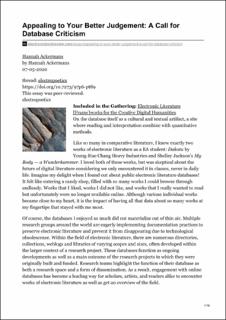| dc.contributor.author | Ackermans, Hannah | |
| dc.date.accessioned | 2021-05-06T09:40:14Z | |
| dc.date.available | 2021-05-06T09:40:14Z | |
| dc.date.created | 2020-10-26T11:29:01Z | |
| dc.date.issued | 2020 | |
| dc.identifier.issn | 1553-1139 | |
| dc.identifier.uri | https://hdl.handle.net/11250/2753887 | |
| dc.description.abstract | Engagement with public databases has become a leading way for scholars, artists, and readers alike to encounter works of electronic literature as well as get an overview of the field. Although acknowledged as an important and difficult process, database construction is, in practice, too often underestimated as merely a preparatory task in Digital Humanities. Through the conception of database criticism, I provide a critical apparatus to approach databases in terms of qualitative and aesthetic characteristics. Considering public databases as media texts, I take a digital hermeneutic approach to the reading strategies involved in engaging with databases. What follows is the presence of databases as cultural artifacts that are themselves studied in humanities and social science frameworks. It is in the interest of both the quality and esteem of the databases to develop ways to study and evaluate them parallel to academic reviews of monographs and edited collections. I offer a media-specific framework of four core vectors for database criticism: data and scope, experience, aesthetics, and labor. Building on Critical Data Studies, database criticism needs to identify the means and objectives of the database and thing along with those in reviewing the data. But a database is so much more than its data. A good database incites the pleasure of anticipation and this is determined by both the user and browsing experience. This is linked to the aesthetics of the database, which includes the accessibility of the database at its core. Finally, the explicit evaluation of labor addresses which value is placed on various tasks of developing and maintaining an academic database. My call for database criticism opens up ways to revalue the databases as dissemination of research and provide the opportunity to highlight all elements that we wish to be part of the field going forward. | en_US |
| dc.language.iso | eng | en_US |
| dc.publisher | The emergent digital literary network | en_US |
| dc.relation.uri | https://doi.org/10.7273/97p6-pt89 | |
| dc.rights | Attribution-NoDerivatives 4.0 Internasjonal | * |
| dc.rights.uri | http://creativecommons.org/licenses/by-nd/4.0/deed.no | * |
| dc.title | Appealing to Your Better Judgement: A Call for Database Criticism | en_US |
| dc.type | Journal article | en_US |
| dc.type | Peer reviewed | en_US |
| dc.description.version | publishedVersion | en_US |
| cristin.ispublished | true | |
| cristin.fulltext | original | |
| cristin.qualitycode | 1 | |
| dc.identifier.doi | 10.7273/97p6-pt89 | |
| dc.identifier.cristin | 1842229 | |
| dc.source.journal | Electronic Book Review (EBR) | en_US |
| dc.identifier.citation | Electronic Book Review (EBR). 2020 | en_US |

